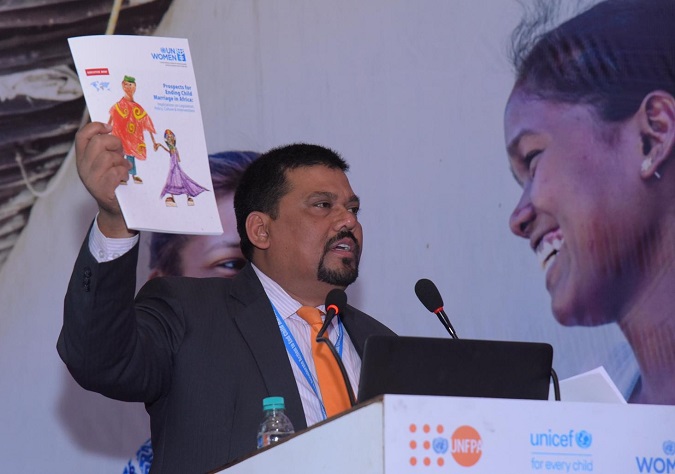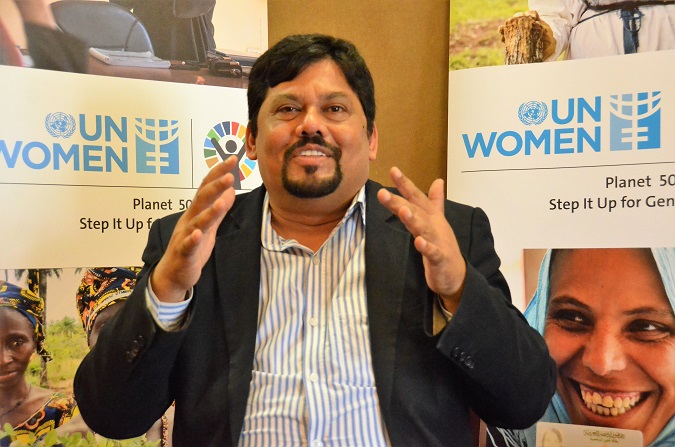Violence Against Women Prevalence Data is Vital to Achieve SDGs
“When barriers to the full participation of women in all sectors are removed, women are empowered to contribute and influence development and achievement of all SDGs,”Date:

The United Nations Sustainable Development Goals (SDGs) included targets in Goal 5 aiming to end all forms of violence against women and children. Making available quality data to analyze the complex inter-relationship of many factors relating to violence are essential to achieving the SDGs. Currently, the data on violence against women in many countries is integrated into Demographic Health Survey’s (DHS) and thus not comprehensive. Over the years, UN Women (formerly UNIFEM) has been advocating and supporting countries in investing more in the regular production of data that reflects the lived realities of women and girls in various countries.
“Gender equality and women’s empowerment can only be realized when global instruments, laws, policies and national programmes, among other interventions, are able to effectively address the underlying factors pushing back what the Sustainable Development Goal (SDG) 5 on Gender Equality seeks to achieve”, the UN Women’s Regional Programme Manager for Eliminating Violence against Women for East and Southern Africa region, Dr Sadiq Syed says.
He was speaking in an interview yesterday, ahead of the United Nations Day to be marked globally on October 24. In Tanzania, the commemoration will take place in Dodoma where the UN and its partners, including the Government of the United Republic of Tanzania, will advocate for “Women and Girls at the Forefront of Achieving Global Goals” in line with this year’s national theme.
According to Dr Syed, ending violence and all forms of discrimination against women and girls contributes to the achievement of SDG 5. “When barriers to the full participation of women in all sectors are removed, women are empowered to contribute and influence development and achievement of all SDGs,” says Dr Syed.
He further explains that one area where UN Women is pushing harder is the generation of quality data to support evidence-based interventions. However, to achieve this, he says, there is need to develop special skills on how to handle and manage violence against women data, in addition to supporting countries to conduct credible standalone surveys.
Dr Syed explains how engagement with various countries have shown the need for standalone surveys that specifically speak to violence against women.
“This initiative will go a long way in improving how countries can respond to violence against women and girls, looking at the high incidences of violence among girls under the age of 15 and women above 50 years, who are usually not covered in most gender-related surveys,” says Dr Syed.

Research has shown that in most countries, gender-based violence surveys are integrated into the Demographic and Health Surveys (DHS), which then limits areas of focus. In other countries in East Africa, the integration approach has made it difficult for violence against women data to receive much attention for appropriate actions.
Dr Syed attributes the integration of violence against women data in the DHS to limited budget allocations and capacities for regular surveys.
The effort to ensure standalone surveys on violence against women builds on a much broader work by UN Women through programmes such as the Making Every Woman and Girl Count and the Strengthening of Methodologies and Measurement and Building National Capacities for Violence against Women Data, a Global Joint Programme with the World Health Organization (WHO).
A regional workshop on “Planning and Implementation of Prevalence Surveys on Violence Against Women” recently hosted by UN Women Tanzania brought together actors working in the area of data including Central Statistical Organizations, Ministries of Women Affairs and Gender and National Planning from nine countries in Eastern and Southern Africa region.
Funded by the Department for International Development of the United Kingdom (DFID), the workshop provided opportunities for partnerships that can leverage on synergies among governments and different organizations for innovations that can sustain standalone surveys on violence against women.
“As a regional sector, we would like to strengthen collaborative efforts between the data specialists, experts in violence against women and gender, and development partners to among other actions, raise awareness on the importance of investing in production of quality violence against women data. We are hopeful that continued efforts will help to improve resources both through the national budgets and funding by various donors,” Dr Syed said.